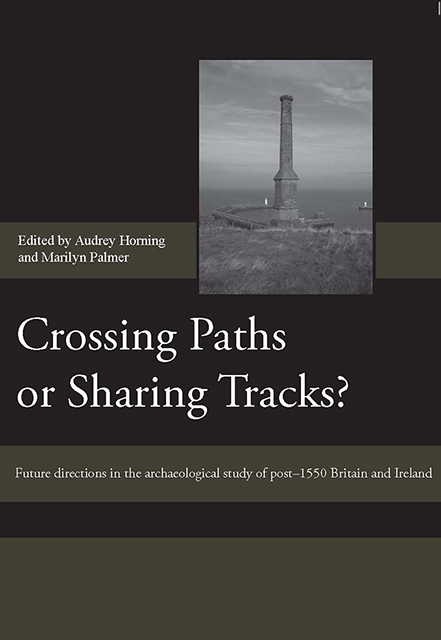 Crossing Paths or Sharing Tracks?
Crossing Paths or Sharing Tracks? Published online by Cambridge University Press: 07 March 2023
Those of us on this side of the Atlantic who choose to describe our field as historical archaeology rather than post-medieval archaeology generally buy into two ideas. One is that ‘historical archaeology’ connotes a complex, ideologically rationalised, praxis; it is not simply the archaeological study of the historically recorded past. The second is that historical archaeology's study area is the entire world; no matter how local our focus, global patterns will still be visible and critical. I subscribe happily to these views, but I also argue that in Ireland, where the field is relatively new, we use this consensus as a platform on which to develop a more nuanced, place-specific, dimension to historical-archaeological philosophy and practice.
INTRODUCTION
This chapter is essentially an opinion piece. The first part of its title signals, through the use of inverted commas, a scepticism that is shared by an increasing number of British archaeologists but by fewer Irish archaeologists than some of us would like. The phrase ‘post-medieval’ carries the imprimaturs of two of the general-archaeological organisations – the long-established Society for Post-Medieval Archaeology and the more youthful Irish Post-Medieval Archaeology Group – represented at the conference of which these are the proceedings. But, such support notwithstanding, it is a phrase that deserves to be surrounded by the flashing lights of inverted commas, lest it remain naturalised, withits implications for how we approach the modern and contemporary pasts loitering unnoticed under the radar of critical thinking about archaeology and its conceptualisation of historic time. Some may argue that a discussion of the appropriateness of the term ‘post-medieval’ is no more than an exercise in semantic hair-splitting, and maybe even that it is a waste of time when so much remains to be done. However, as long as there is a possibility that our subject is weakened conceptually, or has its vision limited, by the retention of a term that was coined at its birth, the critique of ‘post-medieval’ as a construct is valid. Moreover, a conference (and book) subtitled Future directions in the archaeological study of post-1550 Britain and Ireland is precisely the context in which we should look around our house and see what needs to be put in order.
The second part of my title borrows its phraseology from a New Archaeologist.
To save this book to your Kindle, first ensure [email protected] is added to your Approved Personal Document E-mail List under your Personal Document Settings on the Manage Your Content and Devices page of your Amazon account. Then enter the ‘name’ part of your Kindle email address below. Find out more about saving to your Kindle.
Note you can select to save to either the @free.kindle.com or @kindle.com variations. ‘@free.kindle.com’ emails are free but can only be saved to your device when it is connected to wi-fi. ‘@kindle.com’ emails can be delivered even when you are not connected to wi-fi, but note that service fees apply.
Find out more about the Kindle Personal Document Service.
To save content items to your account, please confirm that you agree to abide by our usage policies. If this is the first time you use this feature, you will be asked to authorise Cambridge Core to connect with your account. Find out more about saving content to Dropbox.
To save content items to your account, please confirm that you agree to abide by our usage policies. If this is the first time you use this feature, you will be asked to authorise Cambridge Core to connect with your account. Find out more about saving content to Google Drive.